Big Security Chill At CNS
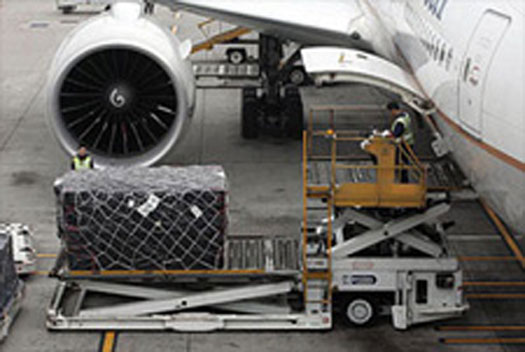
http://www.expeditors.com/pdf/TSA_Certified_Cargo_Screening_Program.pdf
Maybe the first thing to do here is click
the above address that takes you to a U.S. Transportation Security Administration
(TSA) web page that explains what is expected ahead in USA as expansive
new security rules and regulations are right around the corner.
Assuming that many in air cargo would not
quite get the gravity of mandated security demands, TSA during March and
April held meetings about the changes in several American cities.
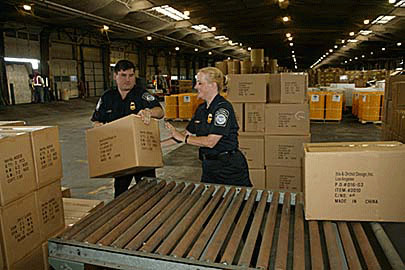 At
CNS Partnership Conference in Palm Beach, Florida USA once again the TSA
security road show was in town, this time in front of 450 high line air
cargo professionals, entrepreneurs and on the street cargo people. At
CNS Partnership Conference in Palm Beach, Florida USA once again the TSA
security road show was in town, this time in front of 450 high line air
cargo professionals, entrepreneurs and on the street cargo people.
For some reason, the meeting hall that morning
was cold like somebody had decided to make everyone sit up and pay attention
by lowering the temperature in the place.
They needn’t have bothered.
Everybody was up for the moment. Driven
by being together and really juiced on the subject, attendees en-masse
really let TSA have it in spades, telling the agency in no uncertain terms
that while supporting security and accepting responsibility for a safer
air cargo environment all along the distribution chain, the air cargo
industry beset with competition, fuel costs, financial uncertainty and
even over the top intrusion from US DOJ and EEU investigators, does not
like the TSA presentation one bit.
In case the TSA had not realized it and
whether they cared or not, many CNS Partners, as one attendee put it are:
“Frustrated and mad as hell that TSA
seems to want to dump all responsibility for compliance to a sweeping
and outrageously expensive new technology on the doorstep of the industry.”
Worth noting is that here was an air cargo
industry at a conference the way it ought to be.
You sometimes think as you look around the
room full of people like this that maybe nothing will really happen or
change; that people will listen, maybe take some notes, even talk a little
amongst themselves, have a coffee break and come back for some more of
the same before lunch or cocktails.
This session was different.
As the TSA guy rattled on, a collective
gasp rose up in the room like everybody was sucking in the icebox air
to blow the poor TSA suit off the stage.
The TSA/air cargo encounter at CNS last
week was a great moment in air cargo trade shows and worth the trip from
anywhere to be part of the discussion.
Where TSA may have been able to insist and
cajole and poke people in smaller groups at the aforementioned road show
venues, here at CNS were top USA and some other world air cargo leaders
who let the presenter Tom Friedman know in one felled swoop that air cargo
thinks the TSA plan is flawed to the point of being unrealistic and unworkable.
Words flew fast and furious:
“The TSA and USA government is generating
this predicament.
“That TSA “Call To Action”
by Ed Kelly who went “missing in action” at the CNS Conference
left the “poor soul” subordinate Tom Friedman to convey the
bad news which was unfortunate because we wanted to tell Ed what we think.”
Mr. Friedman offered an overview of what
the TSA has implemented thus far (educational and test sites at several
airports around USA).
Mr. Friedman then ended his presentation
saying something to the effect:
“So that is what the U.S. Congress
has mandated, phase one cargo screening must be met by industry compliance
at a 50% level by February 2009 and phase two or the final phase of 100%
compliance by August 2010.
“We pass it to you all for action
and to take care of meeting these requirements.”
After those words the place just went nuts.
“I have never seen such a group of
executive professionals blurt out their feelings that vigorously at what
they just heard,” was one comment.
“Plenty of well known Anglo Saxon
words of disgust and derision,” was another.
Here are some other reactions we gathered.
“The government is not funding this
program CCSP, other than education meetings on the topic.”
“The air cargo industry although has
not defined who will have to bear the costs and where and how.
“That’s just crazy!”
“So what TSA is saying is we have
this problem and mandated law so you guys go spend whatever it takes and
fix it?”
“The screening equipment that needs
to be TSA certified is not off the shelf, in fact systems are still under
review as we speak.
“But no timelines are given as to
when and who gets the approval.”
“Suffice to say that there are perhaps
in excess of 70 pieces of scanning equipment submissions with the TSA
for review.
“But the TSA review team charged with
evaluating security equipment that might find widespread use in air cargo,
we understand includes only 3-4 persons.
“How will they ever be able to conclude
their tests to approve an accepted, effective cost efficient system that
can then be built and put into use in such a short period of time?”
 “The
cost range of the scanning equipment under review is from $35K through
$1.2M. “The
cost range of the scanning equipment under review is from $35K through
$1.2M.
“Who will pay those costs and accept
the ownership in the supply chain to meet U.S. Congress mandates for screening—
will it be shipper, trucker, forwarder, trucker, GSA handlers or airline?”
Worth noting is that TSA during the CNS
Q & A continued it’s “not my problem – you go figure
it” line of reason that further infuriated the gathering.
Representatives from both the NCBFAA and
AFFA got a big ovation at CNS for underlining the tremendous costs involved,
and how unrealistic, politically-driven security compliance demands threaten
to wipe out medium and small freight forwarder companies in air cargo
altogether.
“How could the U.S. Government dump
a huge international security problem on the air cargo industry?”
was the reaction as voices were raised in approval of that comment around
the room.
One forwarder put it this way:
“Security like fuel seems to be a
runaway cost.
“In UK as example, Cathay Pacific
Cargo is offering free transportation on their Monday freighter service
to DXB and HKG ex LHR as long as forwarder pays the (fuel) FSC and (security)
SSC.
“Elsewhere during May both of those
costs are continuing their never ending upward spiral.”
In an industry where often it is hoped and
even said that the best is yet to come, increasingly now for a host of
reasons many fear the worst.
But in affording a venue for this dialogue
CNS delivered on its promise.
Whatever the outcome here, “The Partnership,”
worked.
Geoffrey
Boesch
Honored In New York
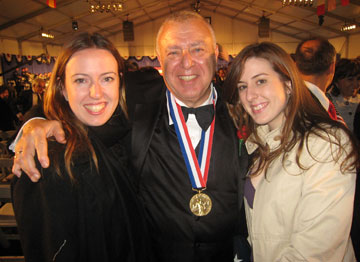 Father’s
Day . . . Although the big holiday yesterday was Mother’s
Day in America, in New York City, on Ellis Island in the shadow
of The Statue of Liberty was air cargo’s own Bill Boesch
and daughters, Heather (right) and Robin (left) celebrating
Mr. Boesch’s winning of the coveted Medal of Honor from
the place where people of many nations began their American
experience that resulted in building the greatest nation in
the world. Father’s
Day . . . Although the big holiday yesterday was Mother’s
Day in America, in New York City, on Ellis Island in the shadow
of The Statue of Liberty was air cargo’s own Bill Boesch
and daughters, Heather (right) and Robin (left) celebrating
Mr. Boesch’s winning of the coveted Medal of Honor from
the place where people of many nations began their American
experience that resulted in building the greatest nation in
the world.
Mr. Boesch was lauded for his
career in air cargo and most recently for his work building
logistics to bring badly needed supply line technology to
the people of Iraq.
The gala annual affair points
to the multi ethnic and racial makeup of the U.S. and to the
American effort to help others.
“It is a special experience
to be honored here with my beloved wife Joanne and my girls
and friends in the audience,” Mr. Boesch said.
“There are many challenges
ahead in 2008 and beyond all around, but after what the air
cargo industry and my country has given me, having the opportunity
to use that knowledge to help others is reward enough.
“Being recognized by the
Ellis Island Medal of Honor is a humbling and deeply emotional
experience.
“I am proud to accept
it while thinking of all my friends and colleagues in air
cargo.”
Bill revealed that his work
will continue on the ground in Iraq where his days moving
supplies around the country are punctuated with danger.
We wondered why after a career
as top executive at American Airlines Cargo, DHL and other
major assignments he puts himself in some measure of personal
danger by working in one of the toughest places on the planet.
He said simply:
“Life and air cargo have
been good to me.
“Now is the time to put
something back and help others.”
Geoffrey
|
|
Ominous UPS Numbers At CNS
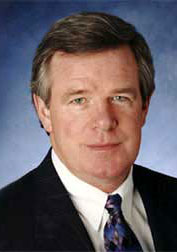 I
was listening to Bob Lekites, Vice President, UPS Airlines’ presentation
at CNS and found myself thinking there were a few surprises: I
was listening to Bob Lekites, Vice President, UPS Airlines’ presentation
at CNS and found myself thinking there were a few surprises:
UPS Airlines is not an all-cargo airline.
There were no questions whatsoever at the
conclusion of the talk.
For the last twenty years the IATA airlines
in particular have recognized the “integrators” as their fiercest
competitors whose share of the traditional cargo market has been growing
- first inching into and then galloping over time.
Yet no one seems to talk about fighting
them anymore – rather emulating their processes has become the norm.
I consider Cargo2000 to be a result of that
trend, as is e-freight.
Airlines and forwarders aim at jointly providing
services competing with or on par with the integrators on the latter’s
terms – delivering service oriented measures that encompass tracking,
visibility and ease of doing business with and using technology.
The lines of the typical forwarder/airline
product have been further blurred with the acquisition by and integration
of Fritz and Menlo into UPS.
It must be a shipper’s dream come
true – or is it?
I suspect those who really know aren’t
saying!
Coming back to the UPS Airline president’s
speech at CNS, I wonder – have the definitions and categorizations
we had in this industry for years given place to a shifting paradigm?
I am not sure what to make of it when UPS Airlines isn’t an all-cargo
airline; its fleet carries a mix of envelopes, small packages and cargo
on every flight, obviously in a much different ratio and particularly
revenue mix than any combination carrier or all-cargo airline that carry
cargo and mail.
The speaker sounded like an airline executive
when it came to listing the types and number of aircraft in the fleet
and the challenges UPS Airlines face, as does every other carrier today,
with exploding fuel prices and the various steps taken to reduce consumption
whenever and wherever possible.
When Bob Lekites then indicated that the
fuel saving measures for his airline are expected to result in a reduction
of 250,000 gallon a year, I thought either few people were paying attention,
were text-messaging or couldn’t be bothered to do the math.
Even assuming $4 a gallon for fuel (IATA
listed $2.585 in its May 2, Jet Fuel Price Monitor), that’s one
million dollars a year; every penny saved is important, but against the
backdrop of its revenue it amounts to a very, very small figure for a
fleet of 260 plus aircraft.
I point this out only to illustrate the
limited options carriers have when it comes to combating these stratospheric
fuel prices effectively.
If that’s the most UPS Airlines with
their vast resources can do, one wonders what the industry is really in
for and how realistic a solution rearranging the chairs on the deck of
the Titanic may turn out to be.
Ted Braun
www.tedbraun.com
After
McCaffrey What's Next?
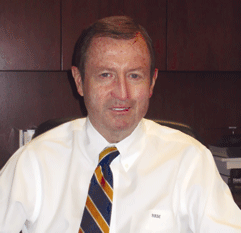 We
all now know that Bruce McCaffrey who served Qantas Cargo as that carrier’s
top USA executive for more than 27 years, in fact since the time when
George Stark quit the airline and went into trucking up in San Francisco,
has been fined USD$20,000 and given an eight month jail sentence by the
USA Department of Justice reportedly for conspiring to fix prices. We
all now know that Bruce McCaffrey who served Qantas Cargo as that carrier’s
top USA executive for more than 27 years, in fact since the time when
George Stark quit the airline and went into trucking up in San Francisco,
has been fined USD$20,000 and given an eight month jail sentence by the
USA Department of Justice reportedly for conspiring to fix prices.
What we don’t know is how Bruce was
snared by law enforcement, although there are a few clues.
In the first place, cops for all the uniforms
and drum beats, most always need informants to catch someone.
Although I am not sure of the statistics,
it appears that everything from a world full of cameras and unidentified
sources is the greatest help to police and other gangbusters when trying
to solve crime at any level.
How those gangbusters are approaching air
cargo price fixing seemed at the onset a couple years ago to be by offering
some kind of immunity to companies that are willing to pay a fine and
then cooperate by revealing all they know about how air cargo rates and
deals are made.
But Bruce having served his company in an
exacting and certain manner of doing business, as said for more than 27
years, appears to have been just thrown under the bus by Qantas.
First, it just doesn’t wash that Qantas
had no idea how the air cargo business works.
What can only wonder what lies ahead for
what could be scores of other air cargo sales and marketing types if this
throw down by law enforcement continues.
“Law enforcement is demanding diaries
and appointment books,” a source said.
“In the case of McCaffrey who do you
think he might end up, like it or not, turning over?
“You can think that some of the best
known, most familiar names in air cargo right now feel like they are out
there twisting in the wind.”
Another source we talked to said this.
“If you want to talk about collusion
and anti-trust price fixing and back room deals how about the US DOJ and
EEU law enforcement going after OPEC and the oil companies that have turned
the world upside down during the past few months?”
“We now have eight or nine carriers
down in USA and maybe a like number hanging on for dear life as oil costs
ramp up.
“If this thing continues and by mid
year oil is at USD$150 a barrel it might be curtains all around, at a
level unseen in aviation history.”
So what lies ahead?
“It’s (the investigations) all
about business,” another source said.
“In the end some companies will emerge
and in fact a few may have positioned themselves to gobble up huge market
share.”
In the meantime the highest profile, air
cargo executive ever to take a fall must wonder what hit him, as Bruce
McCaffrey wakes up each day.
First he led Qantas Freight to third party
cargo handling in 1980.
An idea, long before its time was embraced
or thought about by others, and took hold quietly at Qantas, and later
was copied by the entire industry.
Then Bruce masterminded Qantas Freight into
creating a modern steel and glass air cargo transfer facility at LAX that
was built upon removal of the dilapidated remains of his former employer,
Pan Am Clipper Cargo.
Bruce McCaffrey, the old cargo pro who served
in the business at Florida-based National Airlines as regional manager
at JFK, in fact was the very first management employee hired from National,
when PAA acquired that carrier.
Bruce McCaffrey, a Villanova University
finance major graduate said of the renovation and building of Qantas cargo
LAX in 2004:
"We delivered this space at about 25%
of the comparable cost of similar construction at LAX."
McCaffrey, an easy going former helicopter
pilot (he once piloted a HU-1 (Huey) for the army reserve based in Atlanta,
Georgia) relished the thought of building a great air cargo resource and
operating his USA freight centers with class and distinction.
"Qantas is the reliable airline that
is among the world's most profitable," he said in 2004.
That comment bears close examination especially
now, because for twenty five or thereabouts of the twenty-seven years
under Mr. McCaffrey, the North American cargo operation met or exceeded
its financial target.
Bruce McCaffrey operated in a zone where
he knew about everything, including the steel arms holding the LAX cargo
building up.
Now with all of that over, others can only
wait and wonder what’s next?
Geoffrey
|



